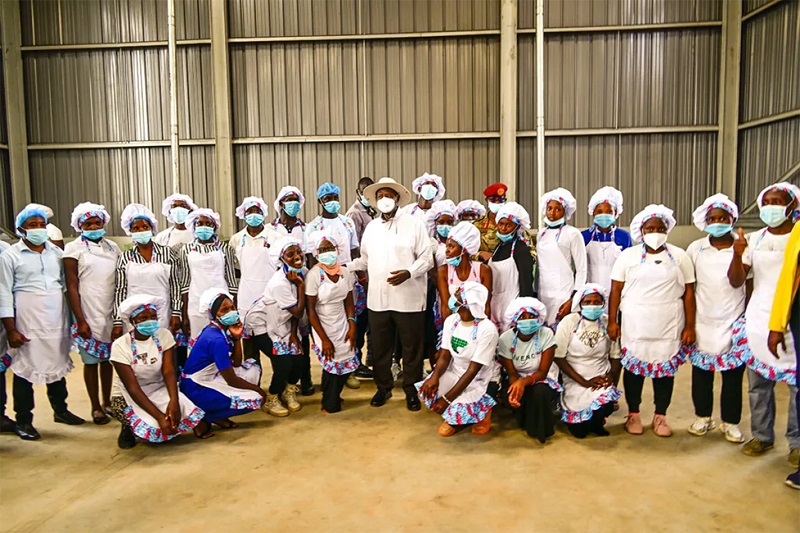
CAPTION: President Yoweri Museveni recently visited Mutesa I Royal University during his recent Poverty Eradication tour of Greater Masaka area. He called upon public Universities to collaborate with private ones in order to bolster research
Kampala, Uganda I HABARI DAILY I The Uganda Parliament has called upon the Ministry of Finance, Planning and Economic Development (MFPED) to allocate a grant of SH2.5 billion to each public university. This is in a bid to bolster research and innovation capabilities in Uganda’s public universities. The move comes as part of the approved 2023/24 Budget proposals, highlighting the underfunding of research in universities, with only Makerere University (MUK) receiving sh2 billion for research, in addition to its sh30 billion allocation.
Recognizing the crucial role of universities in Africa’s research ecosystem, the African Research Universities Alliance (ARUA) asserts that these institutions contribute between 50 to 90 percent of the research output in their respective countries. Consequently, the call for increased funding aims to strengthen the research capacity of public universities and further position Africa as a hub of knowledge creation and innovation.
Professor Wasswa Balunywa, Principal of Makerere University Business School (MUBS), emphasized the significance of education in Uganda’s quest to overcome underdevelopment. In a recent interview, he urged the government to prioritize education and allocate a substantial portion of the budget to this critical sector.
The Budget Committee Report on the Annual Budget estimates for the financial year 2023/24 expressed concerns over the dilapidated infrastructure at Makerere University, calling for additional funding of sh52 billion for the renovation of the School of Medicine and ten halls of residence. Furthermore, the report recommended an allocation of SH53 billion for the construction and equipping of laboratories at the School of Health Sciences and the College of Veterinary Medicine, Animal Resources, and Biosecurity.
Similarly, Mbarara University of Science and Technology (MUST) is in need of increased financial support. The report suggested an allocation of SH7.2 billion to enable the university to expand its staff by 34 percent, SH2.12 billion for staff promotions, SH12.78 billion for the construction of a central administration block at Kihumuro campus, and funds for the completion of the Computing and Informatics phase II and a multi-purpose lab.
To avoid recurring supplementary requests, Parliament urged the MFPED to revise the recurrent non-wage budget of Muni University, allocating at least SH7.71 billion for the financial year 2023/24 and the medium-term expenditure framework (MTEF) period. Additionally, recommendations were made for the completion of a modern Health Science laboratory, administration annex building, mechanical engineering workshop, and operationalization of the Madi-Okolo Agricultural Training Center and Erepi PTC.
The budgetary concerns extended to other institutions such as Kabale University, which requires sh9 billion for infrastructure development and SH22.6 billion for the procurement of specialized equipment and machinery. Lira University was also highlighted, with Parliament recommending an additional SH12.6 billion for the completion of the main administration block and procurement of necessary medical equipment.
The Uganda Management Institute (UMI) was not left out, as the legislators proposed sh1.5 billion for the construction of new classroom blocks at Mbale and Mbarara campuses, along with SH10 billion to initiate the construction of a multi-purpose building at the Kampala campus.
In the report, Parliament urged the MFPED to review the budget of the Higher Education Students Financing Board (HESFB) to clear arrears accumulated during the financial years 2021/22 and 2022/23. The board was recommended to receive an additional SH25.502 billion for the financial year 2023/24, enabling it to fulfill its mandate of providing loans and scholarships to financially disadvantaged Ugandan students pursuing higher education.
Public universities in Uganda are favored by students due to their international recognition and affordability. It is widely believed that graduates from these institutions have an advantage in securing employment compared to their counterparts from private universities.
Uganda currently boasts ten public universities, including Busitema University, Gulu University, Kabale University, Kyambogo University, Lira University, Makerere University, Mbarara University of Science and Technology, Muni University, Soroti University, and Uganda Management Institute. With increased funding for research and infrastructure development, these universities are poised to contribute significantly to Uganda’s educational and economic advancement.

